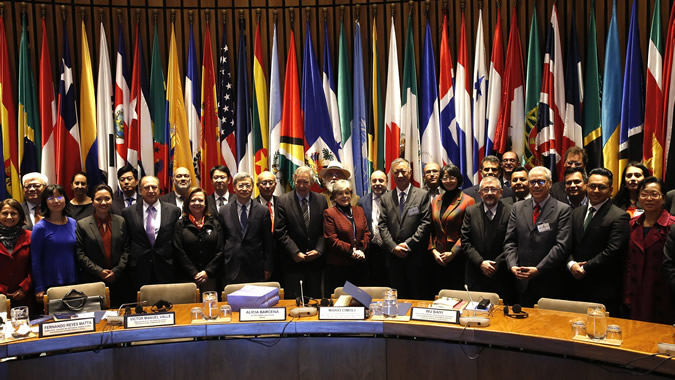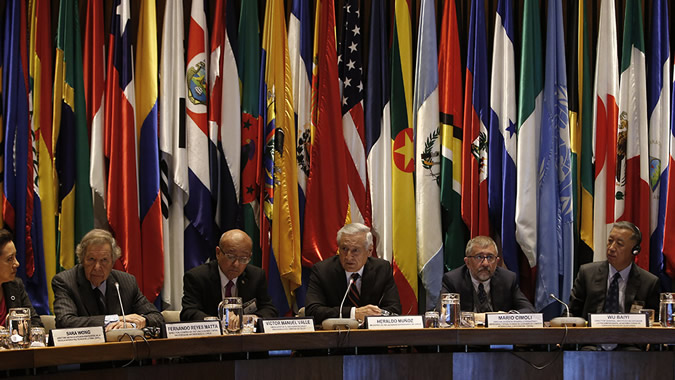China and Latin America and the Caribbean Must Advance Together Toward the Digital Revolution, the Green Economy, Job Creation and the Fight against Inequality: ECLAC
Work area(s)
The organization’s Executive Secretary, Alicia Bárcena, spoke at the conclusion of the debates of the First CELAC-China High-level Academic Forum, which was held in Santiago, Chile.

“We must work diligently so that Latin America and the Caribbean, hand in hand with China, advances toward the digital revolution, the green economy and on social policies that are connected to industrial policies in order to create employment and fight inequality,” Alicia Bárcena, ECLAC’s Executive Secretary, stated at the closing session of the First CELAC-China High-level Academic Forum, which took place at the United Nations organization’s headquarters in Santiago, Chile.
The two-day event, which also included the Fourth China-Latin America and the Caribbean Think Tanks Forum, brought together authorities, renowned specialists and international professors who debated the opportunities for cooperation between both sides with the aim of contributing to the upcoming CELAC-China Cooperation Plan 2019-2021, which will be discussed during the Second Meeting of Foreign Ministers of the Community of Latin American and Caribbean States (CELAC) and China, on January 21-22, 2018 in Santiago.
During her speech at the forum’s closing session, the Executive Secretary of the Economic Commission for Latin America and the Caribbean (ECLAC) called on both sides to unite their visions for fostering sustainable development with prosperity for their people. “Just as President Xi Jinping said when he visited us at ECLAC in November 2016, this is the time to build bridges, not walls; to open markets, not close them; to respect differences and erect a shared house for the generations to come,” Bárcena said.
The senior United Nations official recalled that this very Wednesday, October 18, President Xi Jinping affirmed that his country is actively fighting corruption and poverty, speaking at the inauguration of the 19th National Congress of the Communist Party of China being held in Beijing. “That is the same battle that we must wage in our region. If we do not eradicate those afflictions and the culture of privilege, we will not be able to forge a new generation of constructive agreements for our mutual benefit, nor will we be able to work on the provision of global public goods as China has demonstrated with its commitment to fostering peace, equality, multilateralism and financial stability,” she said.
Alicia Bárcena indicated that since both China and Latin America and the Caribbean belong to the emerging world, they have very similar problems. She highlighted China’s ability to produce big changes in an environment of great uncertainty, changes that serve as an example to our region.
“Rather than an era of changes, we are living through a true change of era, with accelerated demographic transformations, the technological revolution (known as the Fourth Industrial Revolution) and the effects of climate change. We are at a very critical moment in time,” Bárcena said.
China can help establish equilibrium at a global level by confronting all of these macroeconomic, technological and geopolitical uncertainties and imbalances that we are suffering, she added. “United, China and Latin America and the Caribbean can be a very important counterweight for tackling these problems. To achieve that, we must be capable of producing a joint work program, similar to the One Belt One Road initiative (launched last May in Beijing),” she said.
Alicia Bárcena recalled that China has become Latin America and the Caribbean’s second-largest trading partner, following the United States, and it is also an important foreign investor in the region. She insisted that the main challenge for our region in its relationship with the Asian country is how to diversify exports: just five products (soybeans, iron-ore and copper minerals, crude oil and refined copper) account for nearly 70% of the total value exported to China. In addition, Chinese investments in the region reinforce this pattern, since 90% of them are aimed at extractive activities (mainly mining and oil).
In light of this, she insisted on the need for the Chinese foreign investment that reaches the region to help produce more value added and not be centered exclusively on extractive sectors. Then it will be able to better contribute to sustainable development and the structural change that both sides seek, she explained.
“The 2015-2019 Cooperation Plan between CELAC and China gives us an opportunity. ECLAC wants to be part of this process and will help provide follow-up on the relations between both parties. We are fully committed to this issue,” Bárcena announced.
Meanwhile, the Director General of the Institute of Latin American Studies of the Chinese Academy of Social Sciences (ILAS-CASS), Wu Baiyi, thanked ECLAC for having hosted this forum, “which has served a great deal for mutual comprehension and knowledge, as well as to foster trust between China and the region of Latin America and the Caribbean,” he indicated. “I hope that the conclusions of this first academic forum are constructive for the meeting of Foreign Ministers that will take place in January.”
The First CELAC-China High-level Academic Forum was held at ECLAC’s headquarters on October 17-18 and convened by ILAS-CASS, the Institute of Chile (the seat of Chilean academies), ECLAC and the Chilean Ministry of Foreign Affairs. It also included the special participation of El Salvador’s Ambassador to Chile, Víctor Valle Monterrosa, in representation of his country, which holds CELAC’s presidency pro tempore.
At the end of the forum, ECLAC’s Executive Secretary led a book exchange ceremony between ECLAC, the Center for Latin American Studies on China of the Andrés Bello University – which is directed by Ambassador Fernando Reyes Matta, who was the forum’s coordinator – and ILAS-CASS.
Afterward, Alicia Bárcena and Wu Baiyi signed a memorandum of understanding to strengthen academic cooperation between both institutions in the coming years.
Related content

Opportunities for Cooperation between China and Latin America and the Caribbean Are Underscored in Academic Forum at ECLAC
The First CELAC-China High-level Academic Forum was inaugurated at the organization’s headquarters in Santiago and attended by Chilean Foreign Minister Heraldo Muñoz.

Related link(s)
Country(ies)
-
China
- Latin America and the Caribbean
Contact
Public Information Unit
- prensa@cepal.org
- (56 2) 2210 2040
